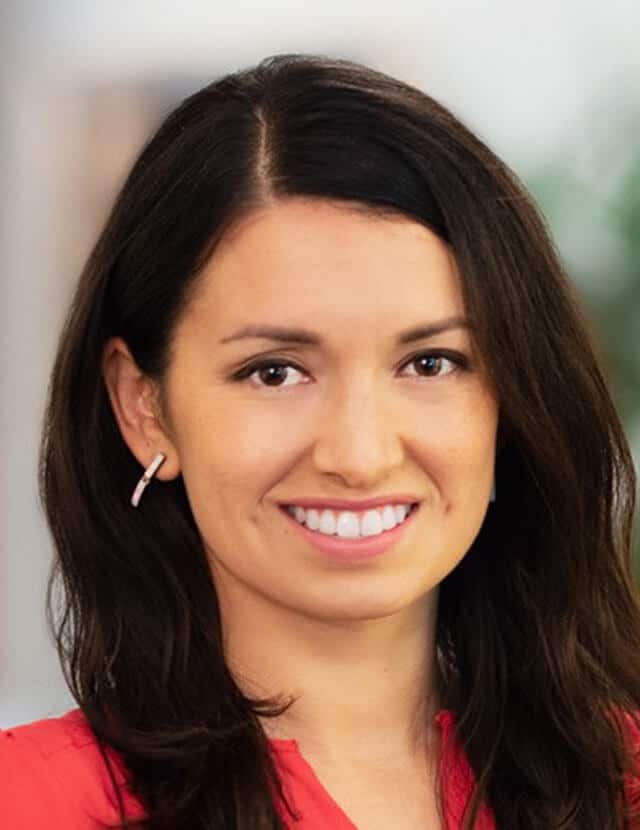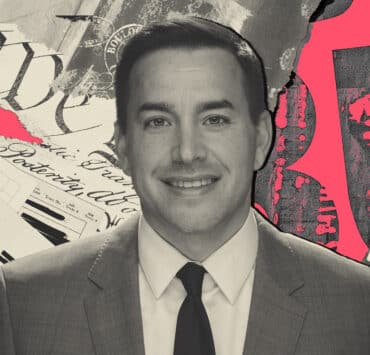|
Getting your Trinity Audio player ready...
|
Roxana Mondragón-Motta, senior investigations counsel at Ericsson, first decided that she wanted to become a lawyer while she was living in Japan. While living and working there and reflecting on the value of being able to communicate in another language, she realized, “The law is essentially its own language,” and knowing that language could be extremely valuable. But the benefits of knowing how to read, speak, and interpret the law wasn’t the deciding factor in Mondragón-Motta’s career choice.
“For me, becoming a lawyer tied multiple strings [of my values and identity] together: education and the importance of it, my working-class background, and the desire to protect my family,” Mondragón-Motta says.
Raised in Chicago in a first-generation Mexican American household, Mondragón-Motta recalls that her parents instilled the value of education in her through storytelling. “I was raised hearing stories about how the entire family saved to send one of my uncles to university,” Mondragón-Motta says. “That itself was an achievement.”
Not everyone in Mondragón-Motta’s family was allowed this privilege, though. When her mother first came to the US, she couldn’t go to school immediately because she had to work. “She would tell me about how she’d wait for the northbound bus to take her to work while, across the street, there were kids her age waiting for a bus to take them southbound to school,” she says.

In part because of this experience, it was important to Mondragón-Motta’s parents to provide a strong education to their children. At the same time, they wanted their children to understand their roots and maintain their connection to the Spanish language. Mondragón-Motta’s parents sent her to Chicago’s first bilingual school, the Inter-American Magnet School,to make sure she could communicate with Spanish-speaking relatives. This included her grandfather who had worked for years in the US as a bracero, the Spanish word for a laborer who works with their arms.
Between 1940 and 1960, braceros came to the US as contract workers to fill labor shortages, similar to today’s H2 visa holders. They withstood demoralizing, exploitative, and inhumane working conditions to send money home to their families.
“On the one hand, it was an opportunity for my grandfather to provide for his family abroad. On the other, it was such a demeaning, racist experience for him that he refused to learn English,” Mondragón-Motta explains.
Learning in both Spanish and English was, at first, a way to stay connected to her extended family. What Mondragón-Motta’s parents didn’t know was that it would shape their daughter’s future as a lawyer.
“When you hear those stories growing up as a child of immigrants, how do you not want to try to protect the people that you love?” Mondragón-Motta asks. A big reason she decided to become a lawyer was so that she could go into nonprofit work, specifically on behalf of immigrants, to protect people in situations like that of her grandfather. But following the Global Financial Crisis in 2008, funding for nonprofit organizations became scarce, making positions doing that kind of work less available.
After struggling to find a position working for a nonprofit, Mondragón-Motta was offered a job as an associate at the law firm Kirkland & Ellis. Her bilingual language skills proved to be an asset, giving her opportunities to do white-collar investigations and immigration pro bono work at Kirkland and then later at other large law firms. Eleven years later, she transitioned to her current in-house role at Ericsson.
Mondragón-Motta acknowledges how her years in private practice prepared her for the transition in-house. Her prior work taught her not only self-discipline but also allowed her to gain insight into the compliance functions at different companies, which she still draws on today. And while some lawyers warned her that in-house counsel work wouldn’t be as stimulating, she couldn’t find it more exciting.
“I feel lucky to have this unique [investigations counsel] position at a multinational company. Working at a large company that has operations in over 150 countries makes it interesting for me as an investigator,” Mondragón-Motta says. She views her role conducting and overseeing internal investigations as an extension of Ericsson’s compliance program—a way to assess the program’s effectiveness and how well employees understand it, as well as an opportunity to identify and suggest improvements.
While Mondragón-Motta’s career has taken some unexpected turns, she looks back on her choices with gratitude: her decision to try working at a big law firm where she received great training and met lifelong friends, her decision to try white-collar investigation work that became her new passion, and finally her decision to take the leap into an in-house counsel position at Ericsson where she has found stimulating work and brilliant colleagues.
Mondragón-Motta feels especially grateful to be a first-generation Latina lawyer at this moment in time and to be a positive example of the value that immigrants bring to this country. “This is a tough time to be an immigrant in America or to be a family member of immigrants. It’s easy [for some] to dismiss all immigrants as criminals. But I am a product of [immigrants],” Mondragón-Mott says proudly. “My software engineer and x-ray technician brothers are a product of [immigrants].”
The senior counsel finds meaning in being able to demonstrate what immigrants and their children can accomplish. She hopes that this will, in turn, allow others to see the humanity of immigrants and how they can help create a more vibrant community.
Gibson Dunn is a leading global law firm, advising clients on significant disputes and transactions around the world. Our exceptional teams craft and deploy creative legal strategies that are meticulously tailored to every matter, however complex or high-stakes. We congratulate Roxana Mondragón-Motta on her well-deserved recognition by Hispanic Executive. Roxana is an insightful and skilled investigations lawyer. She has the ability to seamlessly navigate complex, multijurisdictional investigations matters and effectively manage a wide range of internal and external stakeholders, and we are honored to partner with Roxana on many of these matters.
Miller & Chevalier congratulates Roxana Mondragón-Motta for her recognition by Hispanic Executive. Roxana is relentless in her pursuit of excellence and her drive to deliver exceptional legal services. She is a first-rate leader and teammate, and we are grateful for the opportunity to partner with her. Miller & Chevalier is recognized worldwide as a premier law firm for companies faced with complex compliance and investigations needs around the world. The firm has been recognized as one of the top U.S. firms for investigations in Latin America by Latinvex and Chambers Latin America. Congratulations again, Roxana, on this well-deserved honor!

